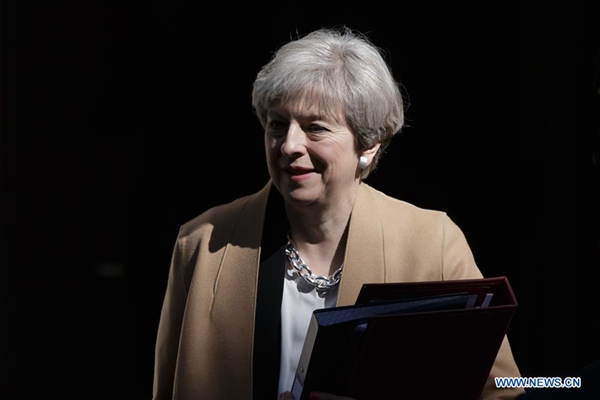May's June election
- By Heiko Khoo
 0 Comment(s)
0 Comment(s) Print
Print E-mail China.org.cn, April 22, 2017
E-mail China.org.cn, April 22, 2017
|
|
|
British Prime Minister Theresa May leaves 10 Downing Street for Prime Minister's questions in London, Britain on April 19, 2017. (Xinhua/Tim Ireland) |
British Prime Minister Theresa May has called a surprise early general election for June 8, claiming it's necessary for her government to negotiate Britain's departure from the European Union with a free hand and a strong mandate.
In other words: one that will not be disrupted by parliamentary procedure, the opposition of the Scottish Nationalists, the House of Lords, or other external political interference. However, the real reason lies within her own party.
The Tories only have a 17-seat working majority. This is split between hard-core Brexit supporters and those who want to minimize its impact. In fact, nobody has any idea about how Brexit negotiations will proceed, so May wants enough MPs behind her to deal with developments on her own terms.
May projects an image of a strong leader determined to represent the national interests against European obstinacy. However, the fate of Britain will by no means be decided by itself alone. Indeed, we are living in a period of turmoil in which today's EU may look quite different in two years' time.
One example is the French election. The first round concludes this Sunday. If either Le Pen or Melechon becomes president after the second round in June, this will represent a cataclysmic shift in the balance of power inside Europe far more profound than the Brexit vote.
The idea that Brexit has somehow elevated the status of Britain in the world is a farcical delusion, but it has gained deep-seated acceptance in the country. Myths can, and often do, acquire the power to move people. However, like a mirror once shattered, the shards of broken glass will be swept up and thrown away.
Theresa May is pretending that her "plan for Britain" will somehow become a reality, if only people vote for it. All that is required is strong leadership and determination and we can face down European opposition and get the best deal.
In Europe, everyone knows the EU must change, but there are those who want to make leaving the EU a painful process, in order to discourage others from a similar path. Nevertheless, Europe is riven by explosive internal contradictions.
There are huge economic disparities between North and South and East and West. The EU is dominated by German economic interests, which structure and reproduce inequity and injustice. The organization's policies serve the interest of employers rather than workers, and this exacerbates negative perceptions of migration and refugees.
Nationalist movements want to break up the EU while leftwing groups for social justice demand a new type of Europe. Their vision is one based on promoting the interests of the poor and the working class through State investment. However, the nationalist agenda is easier to grasp and is currently the rising trend.
Britain's opposition Labour Party led by Jeremy Corbyn faces truly immense hurdles if it is to become the next government. Labour trails in the opinion polls by more than 20 percent. The media has consistently campaigned against Corbyn, most of his MPs have spent much of the last two years trying to sabotage his leadership, and Brexit has polarized working class communities.
So many of those who voted to leave the EU will support the Tories in the belief they are better champions of the national interest. Corbyn's first speech of the campaign revolved around a defense of the poor and the socially excluded, and sought to identify with the outsider and the underdog, one who can defy predictions and overturn the political balance of power.
Almost as soon as she announced the general election, May stated she would not participate in any television debate. This is probably a ploy. She changed her mind about Brexit, first campaigning to remain in the EU and then switching, claiming to be the agent of the people's will to leave.
She had previously said she would not call a snap election before 2020, but now she has done so. Hence, it's almost certain she will "change her mind" on the debate. That's what she does so well - changing her mind, although she dresses this up as a consequence of deep contemplation about the national interest.
Of course, if there were several leaders' debates that went into detail about ideas, economic and social policies, and political philosophy, this would play to Jeremy Corbyn's strengths. After all, in 2015 and 2016 Corbyn defied the odds by winning a series of television and radio debates with the other candidates for Labour leader.
These included were seasoned political debaters. They were resoundingly crushed because Corbyn's message represented an ideological and political alternative that spoke to the majority of Labour supporters and members with a message about social justice, equality, peace and progress.
In the meantime, May is cynically presenting the Tories as a party of the working class and of national unity. Yet, tensions about Brexit have led the Scottish Nationalists to call for independence. And in Ireland, a vote for the unification of the country may take place within the next 5 to 10 years. Either Scottish independence or Irish unification would mean the breakup of Britain.
Heiko Khoo is a columnist with China.org.cn. For more information please visit: http://www.china.org.cn/opinion/heikokhoo.htm
Opinion articles reflect the views of their authors, not necessarily those of China.org.cn







Go to Forum >>0 Comment(s)